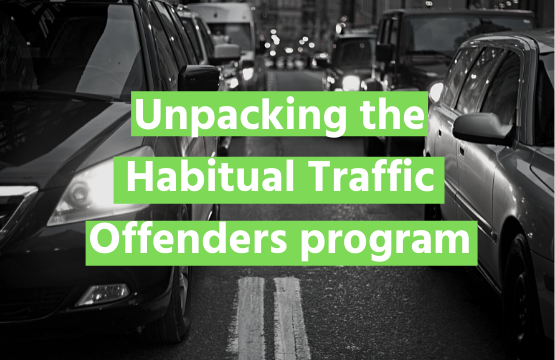Marrickville Legal Centre is helping Habitual Traffic Offenders (HTO) to get their licence back.
Our Centre has specialised in helping people regain independence after having been disqualified from driving for many years.
Before 28 October 2017, where a person was convicted of three or more serious driving offences in the previous five-year period, the person was declared a Habitual Traffic Offender. What this meant is that, in addition to the penalty the person received for the driving offence, an additional penalty of five years disqualification from driving was added.
Where the person was convicted of another serious traffic offence in the five-year period, the court would add a further five-year disqualification period. Under this scheme, repeat offenders could incur driving disqualification periods of 20 years or more.
|
HTO scheme unfair
NSW Parliament recognised the HTO scheme was unfair. It existed in no other state in Australia. The lengthy disqualification periods in some cases were considered “crushing”. Imposing such lengthy driving disqualification periods might actually create more problems, including:
- Increasing the risk of reoffending;
- Serious negative social impacts, for example, restricting a person’s ability to work;
- A sentence out of proportion with the original offence; and
- Imposing significant burden on the criminal justice system.
In response to these concerns, Parliament abolished the scheme from 28 October 2017. However, while there could be no new HTO declarations from that date, existing HTO declarations continued. Fortunately, avenues exist for a person to have their existing HTO declaration quashed.
Removing a HTO declaration
To remove a HTO declaration it is necessary to lodge an application in the Local Court. It is a complex area of law to have an HTO quashed – the process is anything but simple.
A number of steps are required to have the HTO quashed.
These steps include:
- Obtain the required letter from service NSW stating that the HTO declaration can be quashed; and
- Obtain an updated traffic record from Service NSW.
Our Centre also advises that a person should:
- Complete the Traffic Offenders Program;
- Write an apology letter;
- Obtain character references; and
- Obtain evidence of why a licence is needed – for example for caring or employment responsibilities.
Preparing this legal documentation can take a person up to a few months to cover all bases, even with the support of a lawyer. Marrickville Legal Centre can help guide clients through these steps.
Finally, once all these steps have been taken, our Centre may help clients to complete the court form to submit all their documents and if necessary represent the person in court. Should the court quash the HTO declaration, the person may apply for a driver’s licence with Service NSW.
|
Although the HTO program ended in 2017, its legacy remains an important justice issue for those people who are still under the scheme as it perpetuates disadvantage by keeping people in the criminal justice system. Helping members of the community to regain their independence is critical to self-determination.

